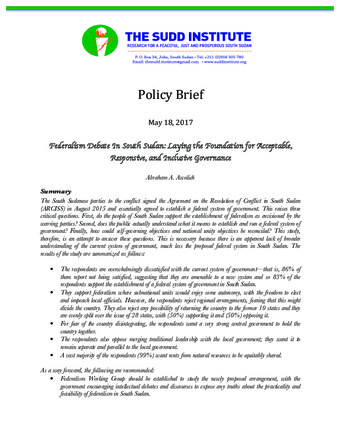Federalism Debate In South Sudan: Laying the Foundation for Acceptable, Responsive, and Inclusive Governance
Publication Summary
The South Sudanese parties to the conflict signed the Agreement on the Resolution of Conflict in South Sudan (ARCISS) in August 2015 and essentially agreed to establish a federal system of government. This raises three critical questions. First, do the people of South Sudan support the establishment of federalism as envisioned by the warring parties? Second, does the public actually understand what it means to establish and run a federal system of government? Finally, how could self-governing objectives and national unity objectives be reconciled? This study, therefore, is an attempt to answer these questions. This is necessary because there is an apparent lack of broader understanding of the current system of government, much less the proposed federal system in South Sudan. The results of the study are summarized as follows:
- The respondents are overwhelmingly dissatisfied with the current system of government—that is, 86% of them report not being satisfied, suggesting that they are amenable to a new system and so 83% of the respondents support the establishment of a federal system of government in South Sudan.
- They support federalism where subnational units would enjoy some autonomy, with the freedom to elect and impeach local officials. However, the respondents reject regional arrangements, fearing that this might divide the country. They also reject any possibility of returning the country to the former 10 states and they are evenly split over the issue of 28 states, with (50%) supporting it and (50%) opposing it.
- For fear of the country disintegrating, the respondents want a very strong central government to hold the country together.
- The respondents also oppose merging traditional leadership with the local government; they want it to remain separate and parallel to the local government.
- A vast majority of the respondents (99%) want rents from natural resources to be equitably shared.
As a way forward, the following are recommended:
- Federalism Working Group should be established to study the newly proposed arrangement, with the government encouraging intellectual debates and discourses to expose any truths about the practicality and feasibility of federalism in South Sudan.
- It is apparent that South Sudan’s central dilemma is how to hold the country together while giving identity groups some degree of autonomy to self-government; this demands deliberative national dialogue to negotiate, even through referenda, acceptable institutional designs.
- With the issue of shared resources coming up repeatedly in the study, a more robust policy on resources distribution is suggested. It is no longer enough to delineate powers of taxation for subnational units; the existing resource rents should be shared equitably.
- The role of the traditional authority and the local government needs some creativity; in this study, the local government does not appear to be as important as the traditional authority.
Abraham Awolich is the former Managing Director of the Sudd Institute. Awolich’s research has focused on management of development organizations working in conflict mitigation, governance and business management. Awolich is the co-founder of the Sudan Development Foundation and the former Executive Director of New Sudan Education Initiative (NESEI). Previous to joining the Sudd Institute, Awolich helped establish a secondary school in Yei and a medical clinic in Kalthok, Awerial County. Awolich has a Master’s Degree in Pubic Administration from the Maxwell School of Citizenship and Public Affairs at Syracuse University and Bachelor’s Degree from the University of Vermont in Anthropology and Business Administration. Awolich is a McNair Scholar and winner of the prestigious Samuel Huntington Public Service Award in 2006.

